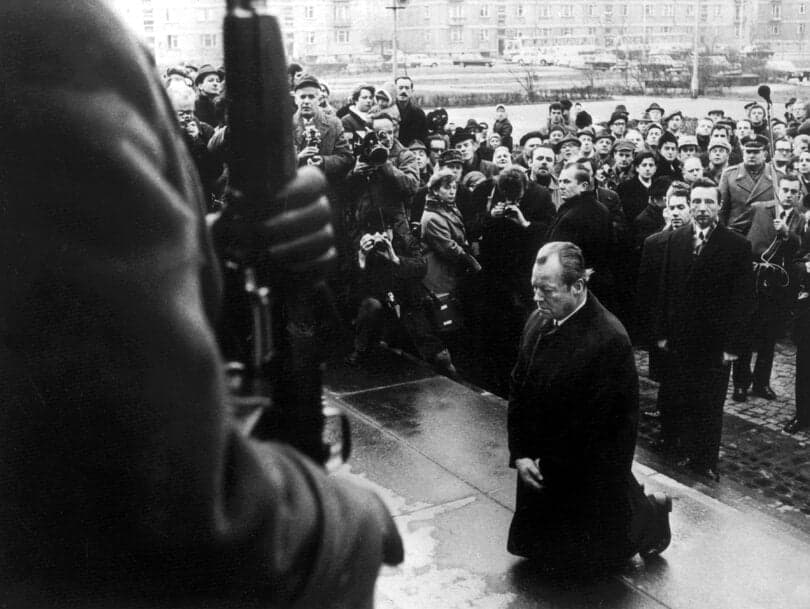50 years on: Germany pays tribute to iconic 'kneeling'

Half a century ago, German Chancellor Willy Brandt visited Warsaw and fell to his knees in front of a memorial to the Warsaw ghetto uprising. It was a seminal moment in German relations with eastern Europe.
On December 7th 1970, Willy Brandt fell to his knees during a visit to a war memorial in Warsaw. On Monday Germany and Poland paid tribute to the importance of the historical gesture of reconciliation.
"The partnership between Germany and Poland is an important prerequisite for a successful future," said President Frank-Walter Steinmeier in a video message on the anniversary.
"But we will not forget the past either. We won't forget the suffering of the people in Poland, nor the historical courage to seek reconciliation and not even a kneeling down to remind us of all this."
In a statement, Polish President Andrzej Duda said: "For us Poles, the kneeling of Chancellor Willy Brandt had great meaning."
"There are actions that turn out to be iconic and which can express more than words," he added.
Foreign Minister Heiko Maas said of Twitter that "Brandt laid the foundation of the Europe in which we live today."
Wir leben heute in einem Europa, für das Willy Brandt die Fundamente legte. Darauf bauen wir mit einer neuen europäischen Ostpolitik auf. Die weitere Aussöhnung mit unseren östlichen Nachbarn, besonders Polen, bleibt unsere große Aufgabe. #50JahreKniefall https://t.co/9hccMZerXv
— Heiko Maas ?? (@HeikoMaas) December 7, 2020
Standing in for the two heads of state, Duda's chief of staff, Krzysztof Szczerski, and Steinmeier's chief of staff, Stephan Steinlein, laid wreaths at the monument to the heroes of the Warsaw ghetto.
'Transformation through reconciliation'
Then Chancellor Brandt fell to his knees on December 7th, 1970 during a visit to the Polish capital. The gesture received worldwide attention as a plea for forgiveness for the crimes of the Nazi era and was viewed as a sign of reconciliation.
Brandt's visit to Warsaw was part of a wider new diplomacy which he called “transformation through reconciliation”, which in effect meant Germany giving up its claims to territories inside Poland, while for the first time recognising (with caveats) the existence of communist East Germany.
It came four months after a visit to Moscow in which Brandt agreed the terms of a new Ostpolitik with the USSR.
In return, the USSR and its European satellite states began to normalise relations with West Germany, thus taking the sting out of one of the most explosive fronts in the Cold War.
The neue Ostpolitik polarised Germany like no other policy since the end of the war.
Conservatives accused Brandt of “treachery” for giving up territorial claims in the east. He only managed to get the deal through the Bundestag after calling a snap election.
Nonetheless, Brandt’s Ostpolitik became the paradigm that would be followed by German Chancellors for decades.
Comments
See Also
Wir leben heute in einem Europa, für das Willy Brandt die Fundamente legte. Darauf bauen wir mit einer neuen europäischen Ostpolitik auf. Die weitere Aussöhnung mit unseren östlichen Nachbarn, besonders Polen, bleibt unsere große Aufgabe. #50JahreKniefall https://t.co/9hccMZerXv
— Heiko Maas ?? (@HeikoMaas) December 7, 2020
In return, the USSR and its European satellite states began to normalise relations with West Germany, thus taking the sting out of one of the most explosive fronts in the Cold War.
The neue Ostpolitik polarised Germany like no other policy since the end of the war.
Conservatives accused Brandt of “treachery” for giving up territorial claims in the east. He only managed to get the deal through the Bundestag after calling a snap election.
Nonetheless, Brandt’s Ostpolitik became the paradigm that would be followed by German Chancellors for decades.
Join the conversation in our comments section below. Share your own views and experience and if you have a question or suggestion for our journalists then email us at [email protected].
Please keep comments civil, constructive and on topic – and make sure to read our terms of use before getting involved.
Please log in here to leave a comment.